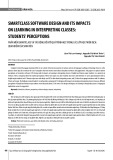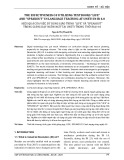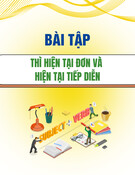
CHUYÊN Đ :Ề CÁC D NG CÂU B Đ NG C B N TRONG TI NG ANH.Ạ Ị Ộ Ơ Ả Ế
Tr ng THCS C u Long - L ng S nườ ử ươ ơ
I. Th i gian th c hi n:ờ ự ệ 27 tháng 4 năm 2011
II. N i dung:ộ
1. Lý thuy t:ế
1.1 Câu b đ ng trong các thì Ti ng Anh.ị ộ ế
- Hi n t i đ n gi nệ ạ ơ ả
- Hi n t i ti p di nệ ạ ế ễ
- Hi n t i hoàn thànhệ ạ
- Quá kh đ n gi nứ ơ ả
- Quá kh ti p di nứ ế ễ
- Quá kh hoàn thànhứ
- T ng lai đ n gi nươ ơ ả
- T ng lai v i “Going to”ươ ớ
- Đ ng t khuy t thi uộ ừ ế ế
1.2 Bare V/ To V/ V-ing trong câu b đ ngị ộ
1.3 Câu b đ ng truy n khi nị ộ ề ế
1.4 Câu b đ ng đ c bi tị ộ ặ ệ
1.5 M t s d ng b đ ng khácộ ố ạ ị ộ
2.Th c hành: ự
-Th c hành gi ng d y trên l p v i 15 h c sinh khá gi i môn Anh văn l p 9ự ả ạ ớ ớ ọ ỏ ớ
-Th i l ng d ki n: 120 phútờ ượ ự ế
III. Các b c ti n hành:ướ ế
1. Nêu m c đích yêu c u chung c a chuyên đ : 20 phútụ ầ ủ ề
2. Th c hành gi ng d y: 12ự ả ạ 0 phút
3. Trao đ i, th o lu n và rút kinh nghi m: 40 phútổ ả ậ ệ

IV. Th c hi n bài gi ngự ệ ả
1. Lý thuy tế
1.1 Câu b đ ng trong các thì Ti ng Anh.ị ộ ế
TENSES ACTIVE PASSIVE
1. The simple present S + bare - V/ V-s/es S + am/is /are + PP
2. The pre.progressive S + am/ is/ are +V-ing S+ am/is / are/ + being + PP
3. The present perfect S + have/ has + PP S + have/ has + been + PP
4. The simple past S + V2/ V-ed S + was/ were + PP
5. The past progressive S + was/ were + V- ing S + was/ were + being+ PP
6. The past perfect S + had+ PP S + had + been + PP
7. The simple future S + will/ shall + bare-V S + will/ shall + be + PP
8. The future with “ Going
to”
S+ am/ is/ are going to+ bareV S+am/is/are going to+be+PP
9. The Modal verbs S + can/could/may...+ bareV S + can/could/may + be + PP
Exercise 1. Change the sentences into passive forms:
1. Somebody has taken my briefcase.
2. The teacher is going to tell a story.
3. Do they teach English here?
4. People are killing wild animals for food.
5. John invited Fiona to his birthday party last night.
6. Her mother is preparing the dinner in the kitchen.
7. We should clean our teeth twice a day.
8. Tom will meet his parents next month.
9. Did Mary buy that beautiful dress?
10.The German didn’t build this factory during the Second World War.
1.2 Bare V/ To V/ V-ing trong câu b đ ngị ộ
1.2.1 Bare V
Eg: -He let me go out.
→ I was let go out./ I was allowed to go out.
- He made me cry.
→ I was made to cry.
- I saw him go out.

→ He was seen to go out.
*Các đ ng t see, watch, hear, make…trong câu ch đ ng + V nh ng trongộ ừ ủ ộ ư
câu b đ ng + To V.ị ộ
1.2.2 To V
Eg1: -The teacher wants his students to do this exercise carefully.
→ The teacher wants this exercise to be done carefully.
=> want, love, like, prefer... sb/ st to be done.
Eg2: I want you to help me.
=> I want to be helped ( by you)
He prefers his friends to meet him outside the theater.
=> He prefers to be met outside the theater by his friends.
=> want, love, like, prefer... to be done.
Eg3: They will have to change the date of the meeting again.
→ The date of the meeting will have to be changed again.
1.2.3 V- ing
Eg: - Hurry up! You know Mr Miller hates people keeping him waiting.
→Hurry up! You know Mr Miller hates being kept waiting.
-She likes her boyfriend telling the truth.
→She likes being told the truth.
- They saw him walking with his friend before he got lost.
→He was seen walking with his friend before he got lost.
Exercise 2. Change the sentences into passive forms.
1. She wants her sister to take some photographs.
2. We have to test these products
3. He likes people to call him "sir”.
4.They will have to pull down that building.
5. I want you to leave me alone.
6. I hate people asking me stupid questions.
7. People don’t make the children work hard.
8. She found him reading her letters.
9. I remember my father giving me a toy drum on my fifth birthday.
10.I don’t like people telling me what to do.

1.3 Causative passive form:
Eg: He is having a garage service his car now.
→ He is having his car serviced now.
. - Richard will have a barber cut his hair.
→ Richard will have his hair cut.
•Active : Have someone do sth / get someone to do sth
•Passive: Have sth done / get sth done.
- I usually get a woman to clean my house on the weekend.
→I usually get my house cleaned on the weekend.
Exercise 3. Change the sentences into passive forms.
1. I had him repair my roof yesterday
2. She will have Peter wash her car tomorrow.
3. John gets his sister to clean his shirt.
4. We are having builders repaint the house.
5. Do you have a man bring milk every morning?
1.4 Câu b đ ng đ c bi t:ị ộ ặ ệ
Eg1: People say (that ) he is a good doctor.
→It is said (that) he is a good doctcr
→He is said to be a good doctor.
- People believe (that) she does that work carefully.
→ It is believed (that) she does that work carefully.
→ She is believed to do that work carefully.
•Các đ ng t th ng đ c dùng trong lo i câu b đ ng này: SAY, THINK,ộ ừ ườ ượ ạ ị ộ
BELIEVE, EXPECT, CONSIDER, REPORT, KNOW….
•Ch ng th ng là: PEOPLE, THEY, SOMEONE….ủ ữ ườ
Eg: They think( that )Tom is the brightest student in class.
→ It’ s thought (that) Tom is the brightest student in class.
→ Tom is thought to be the brightest student in class.
Eg2: They said (that) Mary was very clever.
→ It was said (that) Mary was very clever.

→ Mary was said to have been very clever.
People know(that) he was waiting for his friend.
→ It is known (that) he was waiting for his friend.
→ He is known to have been waiting for his friend.
Eg3: People believe (that) he will win.
→ It is believed (that) he will win.
→ He is believed to win.
Eg4: -She reported (that) the flowers were killed by frost.
→ It was reported (that) the flowers were killed by frost.
→ The flowers were reported to have been killed by frost.
Exercise 4. Change the sentences into passive forms.
1.Someone thinks that Lan will return tomorrow.
2. People know that Japan produces a wide range of cars.
3. People say that he is intelligent.
4 .People said that three men were arrested after the explosion.
5. People say that he is living in London
6. People say that he won a lot of money gambling.
1.5 M t s d ng b đ ng khác:ộ ố ạ ị ộ
- Write your name here.
→ Let your name be written here.
- Don’t do that silly thing again.
→ Don’t let that silly thing be done again.
=> That silly thing mustn’t be done again.
- They suggested banning advertisements on TV.
→ They suggested that advertisements on TV should be banned.
- John used to see Mr Cole at weekends.
→ Mr Cole used to be seen at weekends.
- He decided to sell the house.
→He decided the house should be sold.
Exercise 5. Chang the sentences into passive forms.
1. Open your book.


![Đề cương học phần Ứng dụng công nghệ thông tin trong giảng dạy ngoại ngữ (Application of Information Technology in Language Teaching) [Mới nhất]](https://cdn.tailieu.vn/images/document/thumbnail/2025/20250212/tuetuebinhan666/135x160/881739332468.jpg)









![Bài tập thì hiện tại hoàn thành [kèm đáp án chi tiết]](https://cdn.tailieu.vn/images/document/thumbnail/2025/20251106/thuthao27062004/135x160/41601762420911.jpg)






![Tài liệu ôn tập Ngữ pháp tiếng Anh [chuẩn/mới nhất/tổng hợp]](https://cdn.tailieu.vn/images/document/thumbnail/2025/20250821/vuongdinhlinh1412@gmail.com/135x160/933_tai-lieu-on-tap-ngu-phap-tieng-anh.jpg)




